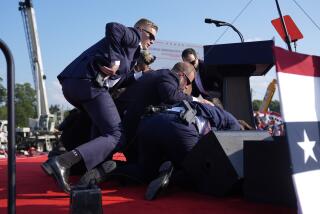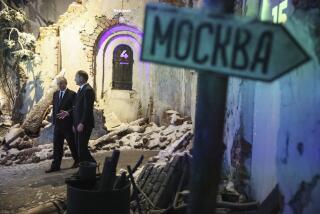Nuclear Plant Safeguards
- Share via
Recent reports that Al Qaeda terrorists originally considered slamming airplanes into nuclear power plants but instead targeted skyscrapers and monuments are of small comfort to Americans still jittery about future attacks.
The nation’s 103 commercial nuclear plants are already “hard targets.” Their domes and towers are made of thick reinforced concrete. Sophisticated security systems and armed guards protect control rooms and monitor access to plants. In the new world of terrorism, however, where zealots are willing to die to cause mass destruction, these plants are still not “hard” enough.
Since 9/11, the Nuclear Regulatory Commission and the utilities that run commercial power plants have implemented many welcome changes. All facilities have remained on the highest state of alert. The NRC has ordered plants to upgrade security in dozens of ways. More than 1,000 new guards now protect the nation’s nuclear plants, bringing the total to about 6,000. New hires must pass a comprehensive background check. The FBI has checked all plant employees against a watch list. Many facilities have moved their security checkpoints farther from plant buildings and added electronic sensors and concrete barricades to keep out intruders or truck bombs.
The NRC says it is in touch daily with the Office of Homeland Security, the Federal Bureau of Investigation, the Federal Aviation Administration, the Coast Guard and other security and emergency-response agencies. The FAA bars planes from circling over nuclear plants, and at the San Onofre plant in Orange County and others on navigable waters, the Coast Guard has set up exclusion zones barring boats, swimmers and fishing.
Yet there are still weak spots.
Federal rules, publicly available, still only require plants to be able to repel a handful of intruders on foot and one person inside the facility--a quaint scenario in light of 9/11. While the NRC says its new orders postulate more realistic attacks, it won’t say how realistic--for security reasons.
Moreover, the NRC has suspended the mock assault drills it had required in past years in favor of “tabletop,” or paper, exercises, insisting that plant managers are overwhelmed with new hires and security directives. Yet guards at many plants performed dismally when the drills were run. Some plants still perform their own “force on force” drills, pitting some plant security guards against others. But the NRC doesn’t always monitor these exercises.
Hiring more guards alone will not safeguard plants. A recent survey of new power plant guards found that even those who had never previously fired a gun received only limited weapons training. Some guards told researchers that they were fearful of their ability to defend the plant in the event of an assault.
SB 1746, now before the full Senate, would build on the NRC’s efforts to upgrade security by filling in some of these gaps. The measure, by Sen. Harry Reid (D-Nevada), would add hiring and training standards for guards, assign a federal security coordinator to each plant and establish a federal task force to take a comprehensive look at the security of nuclear plants. The NRC and the utilities, which oppose several provisions of Reid’s bill, don’t believe that they need this help. We think his proposals can only make everyone safer.
More to Read
Sign up for Essential California
The most important California stories and recommendations in your inbox every morning.
You may occasionally receive promotional content from the Los Angeles Times.













